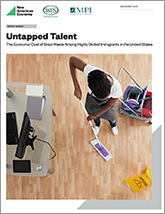
The United States has long attracted some of the world’s best and brightest, drawn by the strong U.S. economy, renowned universities, and reputation for entrepreneurship and innovation. But because of language, credential-recognition, and other barriers many of these highly skilled, college-educated immigrants cannot fully contribute their academic and professional training and skills once in the U.S. As a result they work in low-skilled jobs or cannot find a job — a phenomenon known as brain waste.
World Education Services (WES), New American Economy (NAE), and Migration Policy Institute (MPI) present the key findings from the first-ever U.S. estimates of the economic costs of this skill underutilization for immigrants, their families, and the U.S. economy.
This report addresses:
- Key findings from the report, including discussion of the nearly 2 million individuals affected by and the tens of billions of dollars in negative economic impacts attributable to brain waste
- Policy and programmatic recommendations to alleviate barriers for college-educated immigrants
- Initiatives undertaken by non-profits and some states, including Michigan and Ohio
- Success stories spotlighting immigrants who have overcome employment barriers
Return to globaltalentbridge.org | Return to imprintproject.org
